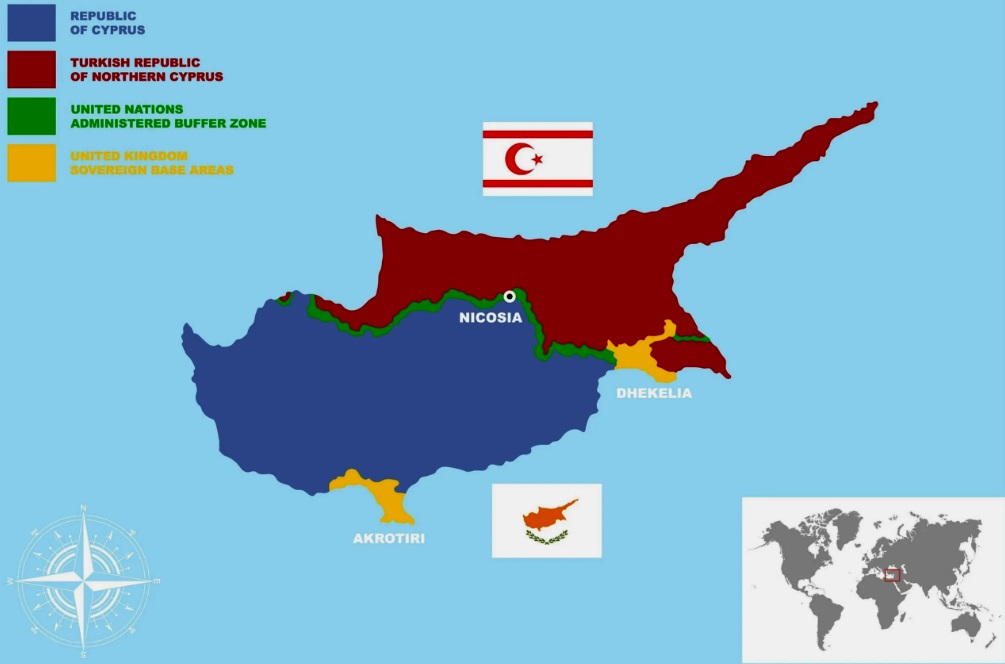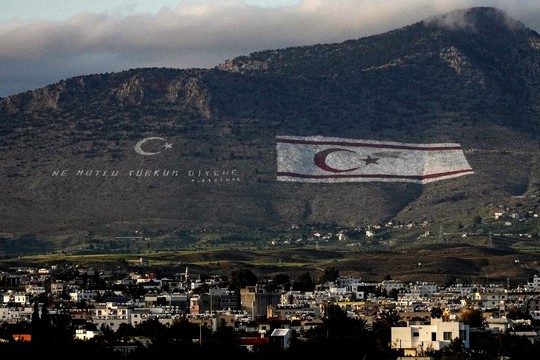The Kyrenia mountain range, north of the divided Cypriot capital, with the flags of Turkey and the Turkish Republic of Northern Cyprus (TRNC) painted on the mountain overlooking Nicosia.
Photo: AFP
It is not Israel's role or desire to liberate Northern Cyprus. However, if the threat from the area reaches a critical threshold, Israel's strategic posture must shift. Israel, in coordination with Greece and Cyprus, must prepare a contingency operation for liberating the island's north, ‘Israel Hayom’ writes.
Cyprus recently marked the 51st anniversary of Turkey's 1974 invasion – a lasting trauma for Greek Cypriots. For decades, Israel treated this conflict as a distant Greek-Turkish issue, but must now clearly acknowledge: Northern Cyprus is not just a Greek-Cypriot problem – it is also an Israeli one.
In practical terms, Northern Cyprus functions as an international no-man's land, enabling Turkey and terrorist groups like Hamas and Iran's Quds Force unrestricted operational freedom.
The area is now a forward base for Turkey's military, hosting sophisticated weapons systems, cyber surveillance, and signals intelligence (SIGINT) infrastructure capable of intercepting both military and civilian Israeli communication, alongside covert terrorist facilities supported by Ankara.
 Map: politurco.com
Map: politurco.com
Turkey can deploy armed drones from Lefkoniko airfield – converted from an abandoned airport into a drone base amid regional gas disputes – far more rapidly than from its mainland bases. Since May 2021, Turkey officially stationed armed Bayraktar TB2 drones there, and more advanced Akinci UAVs were publicly showcased at a military parade in July 2024. These UAVs can rapidly target Israeli gas rigs, naval vessels, and strategic sites. In addition, Turkey's advanced ATMACA anti-ship missiles, with a range exceeding 200 km, could directly threaten Israeli maritime assets, including its critical natural gas platforms. Moreover, Turkey's new Typhoon ballistic missile is capable of precisely hitting targets up to 560 kilometers away. According to Western intelligence, missile bases in Kyrenia and Famagusta are already prepared for their deployment, posing Turkey's first direct ballistic threat to Israel, with the capability of striking Jerusalem, Tel Aviv, and Haifa Bay.
Meanwhile, the EU continues security cooperation with Ankara despite Turkey's occupation of EU territory – a contradiction undermining EU credibility and posing risks to Greece, Cyprus, and Israel as well. Given NATO's requirement of unanimous consent and Turkey's strained relations within the alliance, Article 5 protection is unlikely even in unrelated conflicts, and practically impossible regarding Northern Cyprus, internationally recognized as Cypriot territory.
Turkish control over Northern Cyprus enables Turkey and Iran to bypass sanctions and escalate their strategic threat against Israel. Moreover, hotels, casinos, universities, and ports in Northern Cyprus have reportedly become covert hubs for espionage, blackmail, and intelligence operations coordinated by Turkish security forces and organized crime networks, including 'honey trap' operations targeting international officials.
It is not Israel's role or desire to liberate Northern Cyprus. However, if the threat from the area reaches a critical threshold, Israel's strategic posture must shift. Israel, in coordination with Greece and Cyprus, must prepare a contingency operation for liberating the island's north. Such an operation would neutralize Turkish reinforcement capabilities from the mainland, eliminate air-defense systems in Northern Cyprus, destroy intelligence and command centers, and finally remove Turkish forces, restoring internationally recognized Cypriot sovereignty.
This contingency plan could be termed "Poseidon's Wrath," named after the Greek god of the sea, highlighting maritime dominance and the devastating consequences of a worst-case scenario. The name underscores Israel's focus on safeguarding strategic maritime assets and maintaining open sea lanes critical for regional security. This would remain a contingency plan.
The Israeli strike on Iran's nuclear infrastructure, previously regarded as a highly unlikely scenario, was eventually executed. Turkey, currently constructing the problematic Akkuyu nuclear plant on its Mediterranean coast - a project Russia is quickly abandoning due to recognized risks - should internalize this lesson.
…Israel got a ‘war fever’.
After the recent war with Iran and after the complete capture of the Golan Heights and the adjacent part of Syria, Israel wants new conquests. Tel-Aviv intends to expel the Palestinians from the Gaza Strip, as well as annex the West Bank of the Jordan River, where the Palestinian Authority is located.
Now Israel has set its sights on Northern Cyprus, what is exacerbating its relations with Turkey.
History teaches that total war on many fronts leads sooner or later to collapse. In Israel, apparently, they did not study history well...
read more in our Telegram-channel https://t.me/The_International_Affairs

 11:10 31.07.2025 •
11:10 31.07.2025 •























